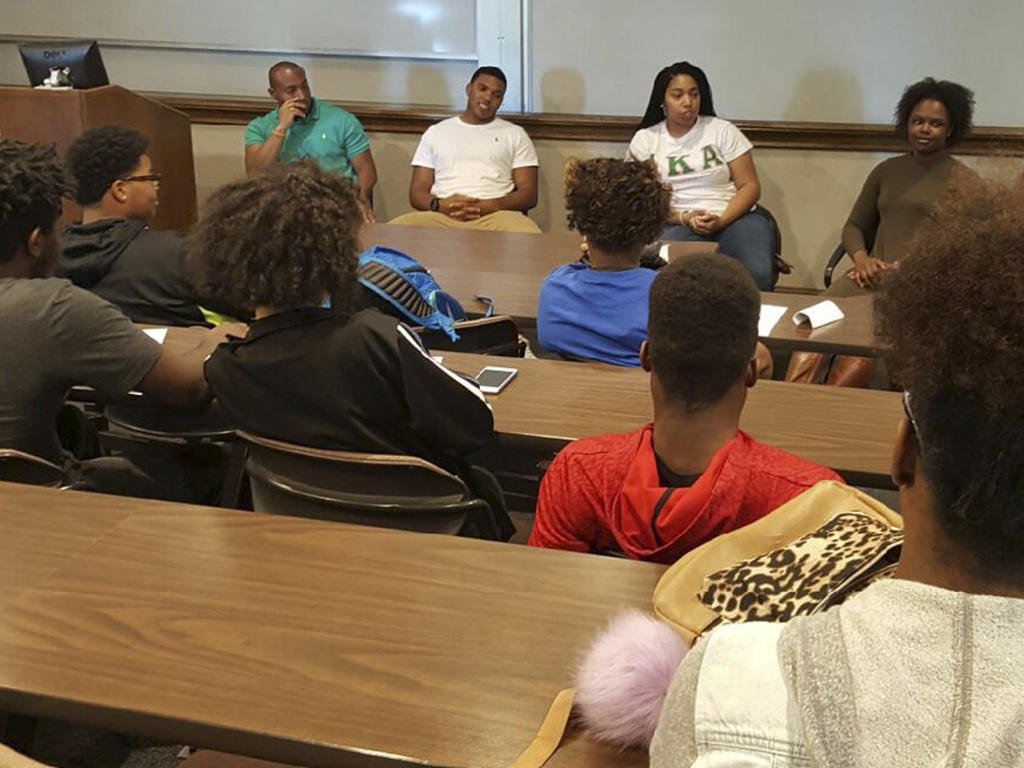A partnership between Rhodes College and GRAD Academy Memphis brought local high school students to campus this spring to see what college life is like. GRAD Academy Memphis, a New Tech Network in South Memphis, is part of the Achievement School District (ASD). The ASD’s goal is to turn low-performing schools into top-performing schools, which is why GRAD Academy takes a project-based learning approach as one means of disrupting inequities in public education.
Dr. Erin Cue, an Andrew W. Mellon Postdoctoral Fellow at Rhodes in the Department of Psychology and the Educational Studies Program, started a partnership with GRAD Academy as part of a community engagement course that she taught in the spring of 2017. The course, titled African American Experience in U.S. Schools, provides a theoretical overview of the experiences of African Americans in education. Rhodes students who participated in the course gained an understanding of course topics and real-world issues by observing and collaborating with teachers at GRAD Academy Memphis.
Katie Keller ’17 and Amanda DellaGrotta ’17 were among those who gained invaluable classroom experience from the course. Keller explains how each Rhodes student was paired with a teacher at GRAD Academy and took part in an action research project to solve specific classroom issues that each teacher wanted to change. “We were doing research on different strategies to improve the classroom based off what our teacher told us, and then implementing them with the teacher and for the students.” Keller’s goal was to increase the interest in reading in the students in her assigned classroom, because the teacher had noticed that the students were becoming uninterested. Keller recruited role-models to come read with students. After Keller’s semester at the school, the classroom teacher reported that her students had kept the interest in reading that Keller had helped instill.
DellaGrotta collaborated with a teacher who wanted to increase one-on-one communication between herself and her computer science students. “My research identified instant messaging as a promising practice to improve one-on-one communication, which my teacher-mentor and I successfully implemented,” says DellaGrotta. “I think the most valuable thing I took away was the necessity to build community, to address and accommodate a wide range of learning needs, and to actively propose ways to create a more equitable educational system in our country.”
Larissa Gregory, assistant principal at GRAD Academy, says the partnership between the two schools has been mutually beneficial. “It was our pleasure here at GRAD to open the doors of our classrooms to college students seeking to further understand the complexities of urban education. The partnership brought growth to our facilitators and scholars, and the research that was conducted has continued to live in classrooms throughout the building and has impacted the blueprint of multiple classrooms.”
Not only did GRAD Academy students get to work with Rhodes students in their school; they were able to participate in mock classrooms led by Rhodes’ faculty, have lunch in the Rat, and attend student discussion panels during their visit to Rhodes’ campus. Because many GRAD Academy students will be first-generation college students, like she was herself, Cue expressed how important the visit to Rhodes was. “This unique opportunity provided Rhodes students the opportunity to engage in action research with teachers at Grad Academy, while also providing GRAD’s scholars the opportunity to interact with college students and engage in the college experience.”
Gregory agrees: “The experience for our scholars to be in and around a college campus is such an opportunity, and will continue to impact their trajectory as they aspire to attend a college, choose a career, and make choices for their future.”
For Keller, the experience emphasized the importance of Rhodes’ connection to Memphis. “I really think that all classes need to have this community involvement aspect, because there are so many great schools in Memphis that can benefit from volunteers and projects like these.”
In the same light, Cue notes that many Rhodes students can also benefit from participation in community engagement experiences in cross-cultural settings. Echoing many of the urban school teachers the students worked with and scholars in the field, she notes that with the changing demographics of our nation’s schools it is becoming more important for our students (and future educators) to gain skills that will allow them to competently meet the needs of the diverse children in our nation’s classrooms.
By Katherine Hancock '19
